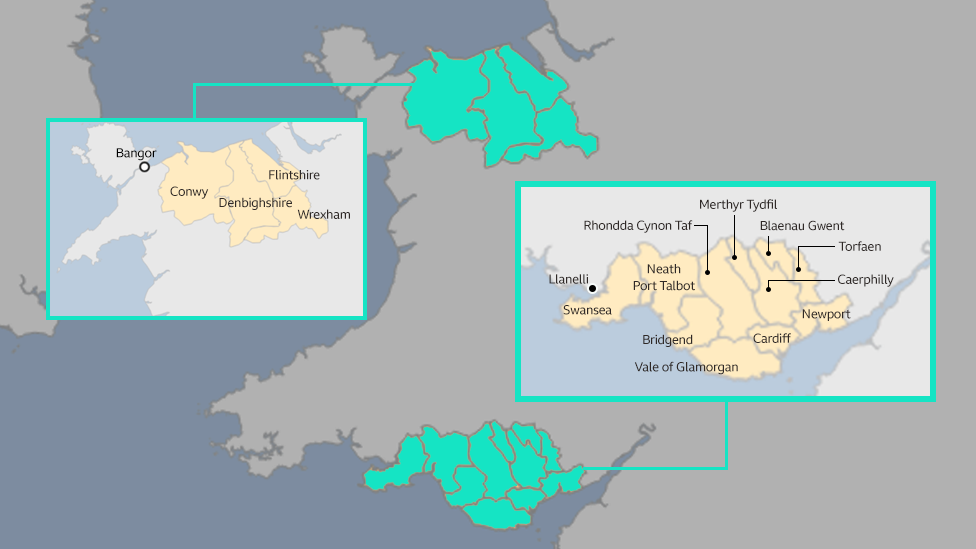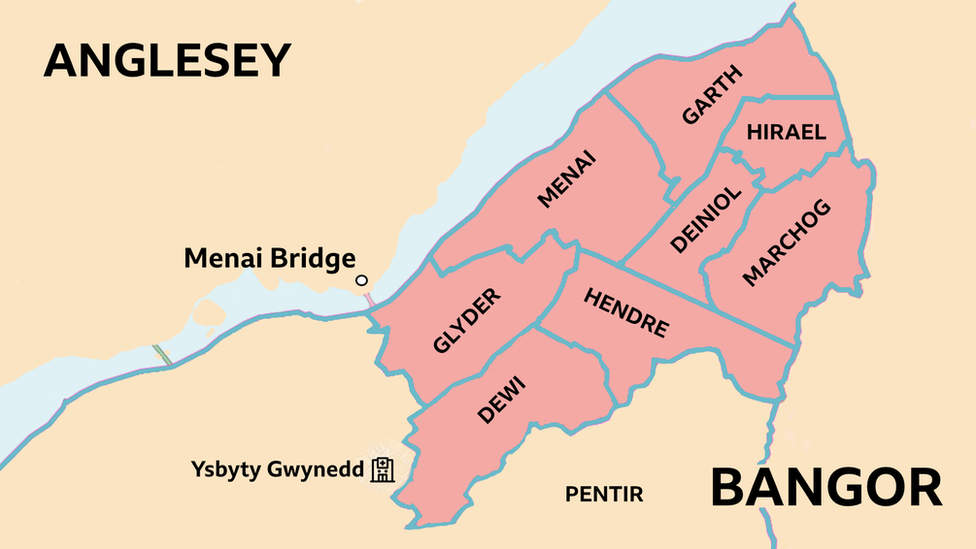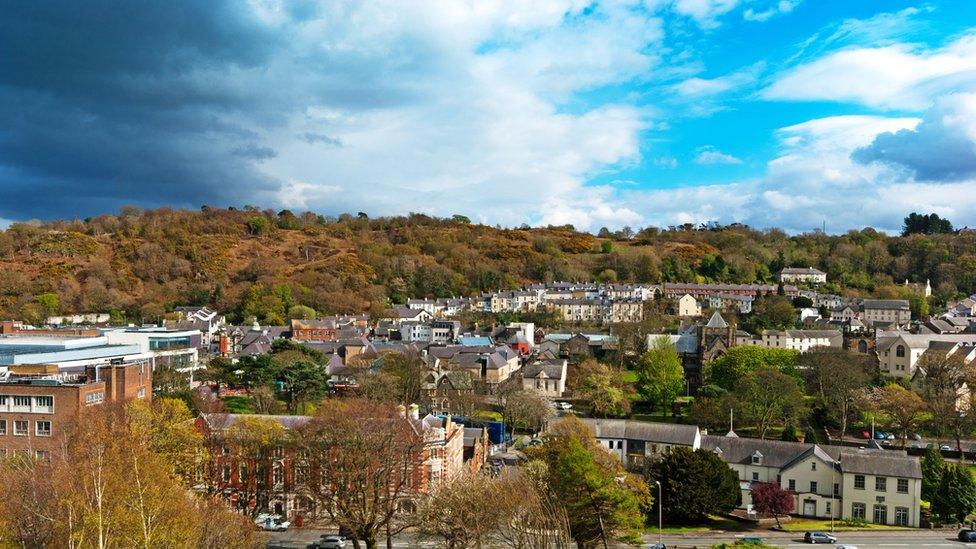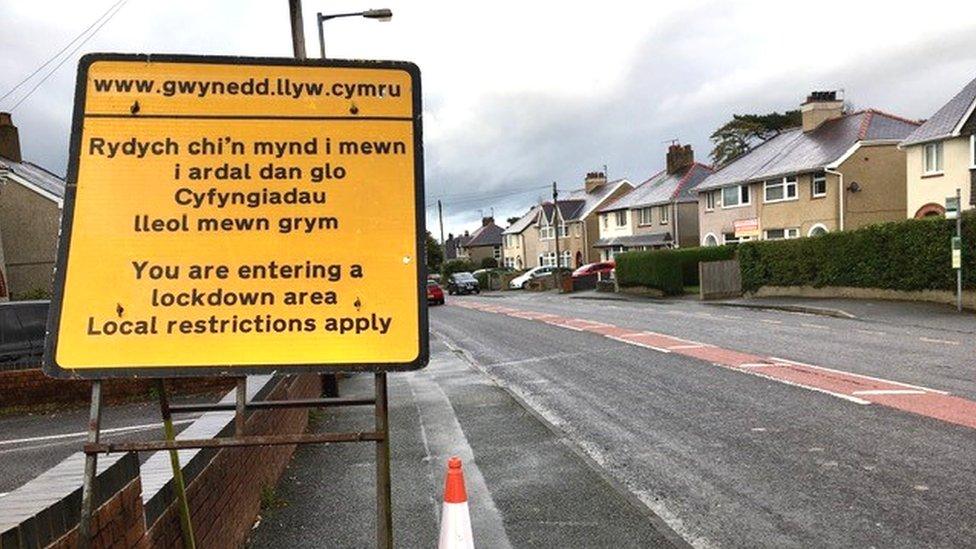Covid in Wales: Second national lockdown considered
- Published
- comments
Wales' Health Minister Vaughan Gething says "more people will die from Covid this winter"
A second national Welsh lockdown is being considered as Covid-19 cases rise, the health minister has said.
Vaughan Gething said there was "growing concern" local restrictions may not be enough to stop a rise in cases, which he said was close to its spring peak.
Seventeen areas of Wales are currently under local lockdown restrictions.
There were more than 100 cases per 100,000 people in Wales over the past week and Mr Gething said there were more than 330 people in hospital.
He warned Covid cases in Wales could be back to peak levels seen in the spring within two weeks.
According to Public Health Wales figures, external the highest number of new cases recorded in a day in April was 391. The total on Sunday was 467.
However, the number of tests has increased ten-fold in that time, but the UK government's chief scientific advisor previously warned a rise in case numbers should not be blamed on an increase in testing.
The so-called R rate - the number of people infected by each new case - was now at 1.37, he said. R needs to drop below 1 for case numbers to begin falling.
Merthyr Tydfil has the highest case rate of any county in Wales with 205.5 cases per 100,000 people.
However, this is only the 55th highest rate in the UK, with Derry City and Strabane District Council's area in Northern Ireland - 871 cases per 100,000 - and Nottingham - 830 - the two worst-hit areas.
Speaking at the Welsh Government's coronavirus briefing, Mr Gething said "all measures", on both local and national levels were under consideration.
He said: "The measures we have put in place at both a local and a national level to date have helped to keep the spread of the virus under check.
"But there is growing concern these will not be enough to help us through the winter because the virus is spreading so quickly.
"We could see coronavirus infections reach the same level as the spring peak in just a couple of weeks.
"I do not want to scare people but I do want people to understand that we face a potentially difficult few months ahead of us."
Mr Gething also said he was "deeply disappointed" that prime minister Boris Johnson had not made it illegal to travel in and out of coronavirus hotspots in England.

Meanwhile, he also said there were 127 positive cases of coronavirus among staff and residents in care homes in Wales in the week to 4 October.
He added numbers in hospital were "increasing steadily", adding: "Very sadly, we know that more people will die from coronavirus this winter."
A "fire break" set of measures to control Covid-19 is under consideration in Wales, such as that seen in Scotland.
Bangor lockdown
Meanwhile, discussions are set to take place later to decide whether to extend restrictions in Bangor to other parts of Gwynedd.
Bangor went into lockdown on Saturday after a rise in coronavirus cases.
Bangor's restrictions affect eight wards in the city: Garth, Hirael, Menai, Deiniol, Marchog, Glyder, Hendre and Dewi.

Eight wards of Bangor are under lockdown
The city had seen a significant cluster of coronavirus cases.
Farhat Abbas owns a shop on Penrhos Road, which straddles the boundary between a locked down area and one which is free of restrictions, said customers were confused.
"A lot of customers are unsure whether they should have come out, shouldn't have come out, and where is actually the boundary for the lockdown," he said.
"It is normally a busy place. This morning it's a little bit quieter than normal."
The number of Covid cases among the city's student population is currently 83 students living in halls of residence and 30 who live in the community, representing around 1% of Bangor's total student population.

Bangor was placed into local lockdown on Saturday
The president of Bangor University's Students' Union said they were aware some students decided to move back home before restrictions on Saturday evening.
Iwan Evans said all students should stay in the area, adding that the union supports the university's decision to continue face-to-face teaching with safety measures in place.
Sian Gwenllian, member of the Senedd for Arfon, which contains Bangor, called for a "clear plan" for the city: "We need to know from government - are the local restrictions working, is that the way forward or do we need to change direction?
"If we need to change direction, we have to do that in an open, transparent way that is communicated to the whole population so people understand why things are changing."

How many cases are there in Wales?
More than 3,200 cases have been reported by Public Health Wales over the past seven days, at a rate of 103.6 cases per 100,000 people.
All of Wales' 22 counties recorded a case rate of more than 20 per 100,000 people, which the first minister previously stated would put a local authority on a watchlist.
Only Ceredigion, Monmouthshire, Pembrokeshire and Powys have case rates of less than 40 per 100,000.
Along with Anglesey, only five counties have case rates less than 50 per 100,000, a figure which, if exceeded, Mark Drakeford said would trigger a local lockdown.
Alongside Merthyr Tydfil (ranked 55th), Flintshire (76th), Rhondda Cynon Taf (77th), Wrexham (79th), Cardiff (88th), Bridgend (86th) and Swansea (100th) are among the 100 highest case rates in the UK.
Could shielding return?
Thousands of people with underlying health conditions were asked to shield during the first lockdown, but Prof Robert West, of University College London, who advises the Welsh Government on its pandemic response, said things were likely to be different for anyone asked to shield.
"We probably could make it a bit easier for people than it was last time," he said.
"We know more about the transmission of the virus. Very few transmissions occur outside so it's not that people would necessarily have to be locked away in their homes. It would depend on the sort of geographic circumstances and the population density in the area."
Speaking on BBC Radio Wales Breakfast, Mr Gething said: "Part of our challenge is we know a number of people suffered during shielding - they were lonely, they were isolated, there was a real impact on mental health. We have to balance all of those things."
Andrew RT Davies, the Welsh Conservative spokesman for health, called for a return to shielding, tweeting, external: "Given the heightened alarm from ministers, including the Welsh Labour Government, why aren't we prioritising the protection of the most vulnerable in society by restarting the shielding process?
"For me, that should be far more urgent than shutting down the economy."
Barbara Owen from Anglesey is recovering following cancer treatment and said she would be prepared to shield again, though was concerned about the potential cost.
"If we have to shield during the winter it's going to cost more because we're in the house more, we're going to use more coal than we do when it's the summer time," she said.
"If we're going to have to give up some things to get the heating and the food, then so be it.
"We're lucky because we've got two absolutely fantastic children who will support us, but it's not right they have to."
'Keeping sane'
Jamie Bowen, from Resolven in Neath Port Talbot had a kidney transplant last year and is concerned at the potential mental health impact of another lockdown.
He said: "If it [shielding] was brought back I certainly wouldn't go the whole hog like last time.
"I was confined to the house, without seeing friends... I found that really difficult.
"That's the hardest thing - the mental health impact for anyone shielding... for me, actually getting out a bit and getting that exercise is fundamental in keeping myself sane."
But he remains cautious: "When you're told you're extremely vulnerable, you get paranoid about touching anything - even receiving the post and your shopping, you just get paranoid that this thing is out there and it's waiting for you and your guard can drop and all of a sudden you're in a desperate situation."
- Published10 October 2020
